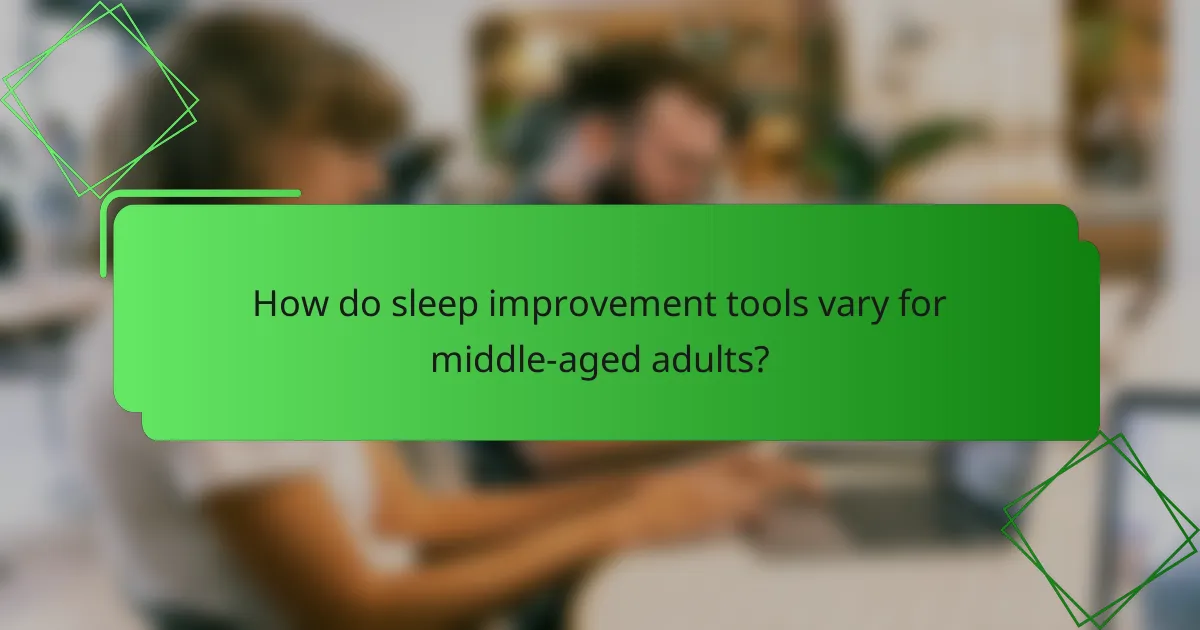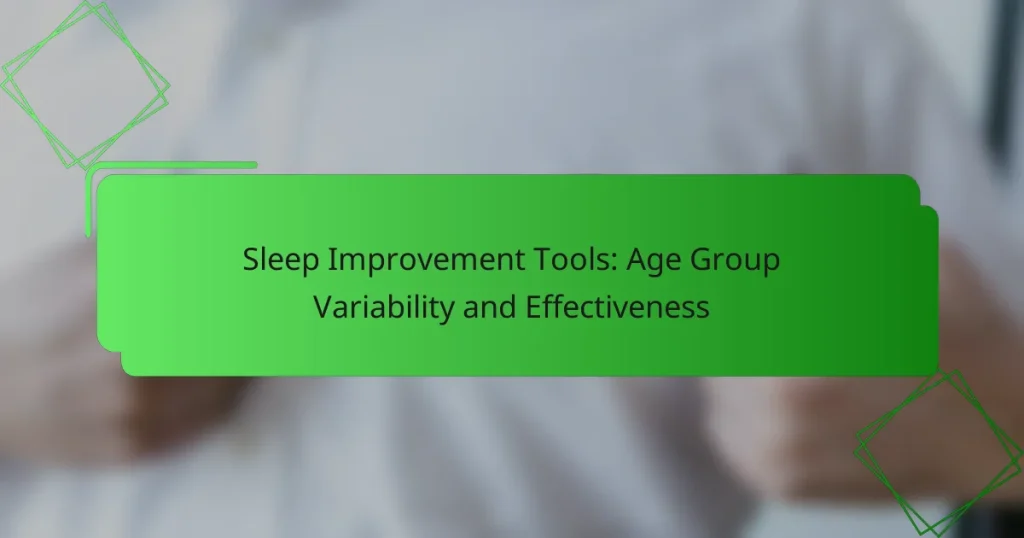Sleep improvement tools vary significantly in their effectiveness across different age groups, addressing unique challenges faced by young adults, middle-aged individuals, and seniors. Young adults may benefit from tech-driven solutions like sleep tracking apps and smart mattresses, while middle-aged adults often find value in relaxation apps and wearable devices. For seniors, adjustable beds and sleep hygiene resources are essential in promoting better sleep quality and managing insomnia. Understanding these age-specific needs can help individuals select the most suitable tools for enhancing their sleep experience.

What are the best sleep improvement tools for young adults?
Young adults can benefit from various sleep improvement tools that enhance sleep quality and duration. Popular options include sleep tracking apps, white noise machines, and smart mattresses, each offering unique features to address common sleep challenges.
Sleep tracking apps like Sleep Cycle
Sleep tracking apps, such as Sleep Cycle, monitor sleep patterns and provide insights to improve rest. These apps use your smartphone’s sensors to analyze sleep stages and wake you up during the lightest sleep phase, promoting a more refreshed feeling upon waking.
When choosing a sleep tracking app, consider features like integration with other health apps, user-friendly interfaces, and the ability to set personalized sleep goals. Many apps offer free versions, but premium subscriptions can unlock advanced features like detailed sleep analysis and personalized recommendations.
White noise machines such as LectroFan
White noise machines, like the LectroFan, create a consistent sound environment that masks disruptive noises, helping users fall asleep faster and stay asleep longer. These devices often feature various sound options, including fan sounds and nature sounds, allowing customization based on personal preference.
When selecting a white noise machine, look for adjustable volume levels and sound variety. Some models are portable, making them ideal for travel, while others may include features like timers or Bluetooth connectivity for added convenience.
Smart mattresses like Purple
Smart mattresses, such as those from Purple, are designed to adapt to your body’s shape and temperature, providing optimal support and comfort. These mattresses often include features like adjustable firmness levels and cooling technology, which can significantly enhance sleep quality.
When considering a smart mattress, evaluate factors such as material quality, warranty, and trial periods. Many brands offer risk-free trials, allowing you to test the mattress for several weeks to ensure it meets your comfort needs before committing to a purchase.

How do sleep improvement tools vary for middle-aged adults?
Sleep improvement tools for middle-aged adults often focus on enhancing sleep quality and duration. These tools can include wearable devices, relaxation apps, and sleep supplements, each offering unique benefits and considerations tailored to this age group.
Wearable devices like Fitbit Charge 5
Wearable devices, such as the Fitbit Charge 5, track sleep patterns and provide insights into sleep quality. They monitor metrics like heart rate and sleep stages, helping users identify trends and make informed adjustments to their routines.
When using a wearable, consider setting realistic goals for sleep duration and quality. Aim for 7 to 9 hours of sleep per night, and use the device’s data to identify factors that may be disrupting your sleep, such as late caffeine consumption or irregular bedtime.
Relaxation apps such as Calm
Relaxation apps like Calm offer guided meditations, sleep stories, and soothing sounds designed to promote relaxation before bedtime. These tools can help reduce anxiety and create a calming pre-sleep routine, which is particularly beneficial for middle-aged adults facing stressors.
To maximize the effectiveness of relaxation apps, establish a consistent nightly routine. Spend 10 to 20 minutes using the app before bed to help signal to your body that it’s time to wind down. Experiment with different features to find what resonates best with you.
Sleep supplements like melatonin
Sleep supplements, particularly melatonin, can help regulate sleep cycles, especially for those experiencing insomnia or irregular sleep patterns. Melatonin is a hormone that signals to the body that it’s time to sleep, making it a popular choice for middle-aged adults.
When considering melatonin, consult with a healthcare provider to determine the appropriate dosage, typically ranging from 0.5 to 5 mg taken about 30 minutes before bedtime. Avoid using it as a long-term solution; instead, focus on establishing healthy sleep habits alongside any supplementation.

What sleep improvement tools are effective for seniors?
For seniors, effective sleep improvement tools include adjustable beds, sleep hygiene resources, and medication options. These tools can enhance sleep quality and address common issues like discomfort and insomnia.
Adjustable beds from Tempur-Pedic
Adjustable beds, such as those offered by Tempur-Pedic, allow seniors to customize their sleeping position for optimal comfort. By elevating the head or feet, these beds can alleviate pressure on the back and improve circulation, which is particularly beneficial for those with chronic pain or mobility issues.
When considering an adjustable bed, look for features like remote control operation and preset positions. Prices typically range from a few hundred to several thousand dollars, depending on the model and additional features. It’s advisable to test the bed in-store if possible to ensure it meets personal comfort preferences.
Sleep hygiene resources from the National Sleep Foundation
The National Sleep Foundation provides valuable resources to help seniors improve their sleep hygiene. This includes guidelines on maintaining a consistent sleep schedule, creating a restful environment, and avoiding stimulants like caffeine close to bedtime.
Implementing good sleep hygiene practices can significantly enhance sleep quality. Seniors should aim for a dark, cool, and quiet bedroom, and consider using white noise machines or blackout curtains to minimize disturbances. Regular exercise during the day can also promote better sleep at night.
Medication options prescribed by healthcare providers
Healthcare providers may prescribe medications to help seniors manage sleep disorders. Common options include sedative-hypnotics and melatonin supplements, which can assist in regulating sleep patterns.
It is crucial for seniors to consult with their healthcare provider before starting any medication. Potential side effects and interactions with other medications should be carefully considered. Non-pharmacological approaches, such as cognitive behavioral therapy for insomnia (CBT-I), may also be recommended as a first-line treatment.

What factors influence the effectiveness of sleep tools across age groups?
The effectiveness of sleep tools varies significantly across age groups due to biological, psychological, and lifestyle factors. Understanding these influences can help tailor sleep solutions to meet the specific needs of different age demographics.
Biological changes in sleep patterns
As individuals age, their sleep patterns undergo notable changes. Younger adults typically experience longer periods of deep sleep, while older adults may have lighter sleep and more frequent awakenings. This shift can impact the effectiveness of sleep tools, as older adults may require different strategies to improve sleep quality.
For instance, melatonin supplements may be more beneficial for older adults who struggle with sleep onset due to decreased natural production of this hormone. Conversely, younger individuals might find cognitive behavioral therapy for insomnia (CBT-I) more effective, as their sleep issues often stem from lifestyle factors rather than biological changes.
Psychological factors affecting sleep quality
Psychological factors, such as stress and anxiety, can significantly influence sleep quality across all age groups. Younger individuals may experience sleep disturbances due to academic pressures or social anxiety, while older adults might face sleep issues related to health concerns or life transitions.
To address these psychological factors, mindfulness practices and relaxation techniques can be effective tools for all ages. Creating a calming bedtime routine that includes activities like reading or meditation can help mitigate stress and improve overall sleep quality.

How can technology enhance sleep quality for different age groups?
Technology can significantly improve sleep quality across various age groups by providing personalized solutions that address specific sleep challenges. Tools such as sleep coaching apps and smart home devices can help users optimize their sleep environment and routines, leading to better rest and overall health.
AI-driven sleep coaching platforms like Sleepio
AI-driven sleep coaching platforms, such as Sleepio, offer tailored sleep improvement programs based on user data and preferences. These platforms typically analyze sleep patterns and provide actionable insights, helping users develop healthier sleep habits.
For example, Sleepio uses cognitive behavioral therapy techniques to address insomnia, which can be particularly effective for adults struggling with sleep issues. Users can expect to engage with interactive content and receive personalized feedback, making the experience more engaging and effective.
Smart home devices for sleep environment control
Smart home devices can greatly enhance the sleep environment by controlling factors such as light, temperature, and noise. Devices like smart thermostats, white noise machines, and smart lighting systems can be programmed to create an optimal sleep setting tailored to individual preferences.
For instance, smart thermostats can adjust the temperature to a comfortable range, typically between 60°F and 67°F (15°C to 19°C), which is conducive to sleep. Additionally, smart lighting can simulate natural light patterns, helping to regulate circadian rhythms and improve sleep quality.

What are the emerging trends in sleep improvement tools?
Emerging trends in sleep improvement tools focus on technology-driven solutions, personalized approaches, and holistic wellness strategies. These tools aim to enhance sleep quality across various age groups by integrating data analytics, behavioral insights, and user-friendly interfaces.
Technology-driven solutions
Technology-driven solutions for sleep improvement include wearable devices, sleep tracking apps, and smart home integrations. Wearables can monitor sleep patterns and provide insights into sleep quality, while apps often offer relaxation techniques or sleep sounds tailored to individual preferences.
Smart home devices, such as smart lights and thermostats, can adjust the environment to promote better sleep. For instance, dimming lights in the evening and maintaining a cooler room temperature can signal to the body that it’s time to wind down.
Personalized approaches
Personalized approaches to sleep improvement tools consider individual sleep needs and preferences. Many apps now offer customized sleep plans based on user data, including sleep history and lifestyle factors. This tailored approach can lead to more effective sleep solutions.
For example, a user who struggles with anxiety may benefit from guided meditation features, while someone with irregular sleep patterns might find value in scheduling reminders for bedtime routines. Understanding one’s unique sleep profile is essential for maximizing the effectiveness of these tools.
Holistic wellness strategies
Holistic wellness strategies encompass a range of practices aimed at improving overall sleep health. These can include mindfulness, yoga, and dietary adjustments, which have been shown to positively influence sleep quality. Incorporating these strategies alongside technology can create a comprehensive approach to sleep improvement.
For instance, engaging in a short yoga session before bed can help relax the mind and body, making it easier to fall asleep. Similarly, avoiding caffeine and heavy meals in the hours leading up to sleep can enhance the effectiveness of sleep improvement tools.


